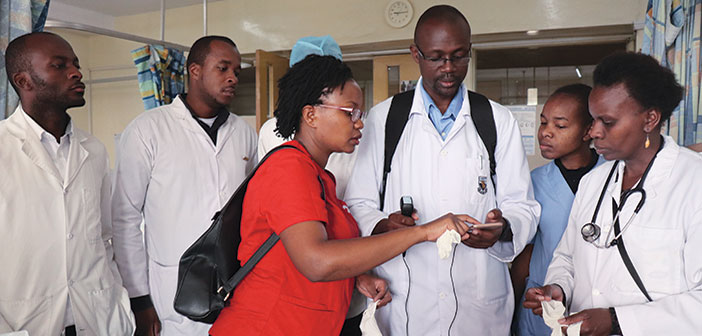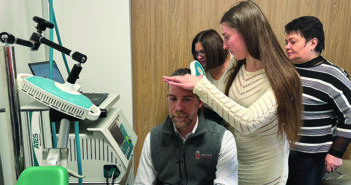Kenya gets its first emergency medicine master’s degree program.
During her emergency medicine training at Brown and Yale, Grace Wanjiku, MD, MPH RES’15 learned to
first check a trauma patient’s ABCs: airway, breathing, circulation, disability, and exposure.
But when she returned to her home country of Kenya in 2015 to start a program teaching trauma care to medical students approaching graduation, they told her they were scared whenever they encountered a patient with acute injuries. They didn’t know what to do or where to start.
No program exists in Kenya to train medical students in emergency medicine (EM)—the field was only recognized as a distinct specialty last year. This fall in Nairobi, Wanjiku, an assistant professor of emergency medicine at Brown, will share her knowledge and experience by helping develop a curriculum for the country’s first master’s degree program in her discipline.
“I feel the gap and I feel the difference in care when I’m working here [in the US]versus when I go home,” Wanjiku says. “It’s a very underdeveloped area, and a lot of patients are suffering and losing their lives just because the doctors are not appropriately trained for this.”
With a grant from the Carnegie African Diaspora Fellowship Program, Wanjiku will collaborate with Benjamin
Wachira, MMed, an assistant professor of emergency medicine at Aga Khan University Hospital Nairobi, to create the master’s program in EM at the university. Wachira is the country’s only full-time emergency physician, and this education is in high demand in Kenya, Wanjiku says.
Without a well-established system of ambulances, clinicians at hospitals are often the first point of contact
for patients with life-threatening injuries, Wachira says via Skype. But many of those doctors are recent graduates or otherwise lack experience. “The least trained people get to work in an environment of the most acutely ill patients,” Wanjiku says, and potentially preventable deaths and injuries do happen.
Mortality decreases dramatically when clinicians receive EM training in these kinds of settings, Wachira adds.
As EM spreads quickly across the globe, more programs in the specialty are emerging. Sustainability is key to Wanjiku’s project, since high physician turnover means a loss of knowledge, says Adam Levine, MD, MPH, director of the Division of Global Emergency Medicine at the Warren Alpert Medical School. “As she creates that residency, she’ll also be creating a sustainable pipeline of future emergency physicians that can work at different hospitals around Kenya and improve the quality of care provided to patients with acute illness and trauma,” he says.
“This is what I believe is my life’s work,” Wanjiku says. “This is a specialty that I love, and I care about it, and I want to be part of developing it in my home country.”




